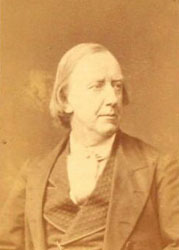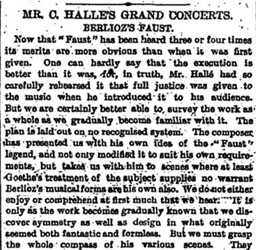
![]()
Charles Hallé conducts Berlioz’s Faust in Manchester
A review published in
The Manchester Guardian, 13 January 1882.
Reproduced with kind permission from Guardian News & Media Ltd

 |
Charles Hallé conducts Berlioz’s Faust in ManchesterA review published in The Manchester Guardian, 13 January 1882. Reproduced with kind permission from Guardian News & Media Ltd |
 |
Charles Hallé made the acquaintance of Berlioz when he went to Paris in 1836; the two men subsequently became lifelong friends. In 1848 Hallé went to England and eventually settled in Manchester. He championed and performed Berlioz’s music in his lifetime and beyond (see Charles Hallé in Berlioz in London: friends and acquaintances).
Hallé conducted several performances of La Damnation de Faust in Manchester (1880 and 1881) a review of one of which appeared in the 13 January 1882 issue of The Manchester Guardian. He also conducted two performances of the Damnation in London in May 1880, the first of which was reviewed in The Times on 4th May.
An image of this article was reproduced on the website of the Guardian on 15 May 2011 in connection with the launch of the paper’s Digital Archive. We have transcribed the text of this review from that image; the syntax and spelling of the original have been preserved, but we have corrected obvious typesetting errors.
We are most grateful to Guardian News & Media Ltd for granting us permission to transcribe and reproduce the article on this page. The image of Charles Hallé is from our own collection.
![]()
![]()
Mr. C. HALLÉ’S GRAND CONCERTS.
BERLIOZ’S FAUST.
Now that “Faust” has been heard three or four times its merits are more obvious than when it was first given. One can hardly say that the execution is better than it was, for, in truth, Mr. Hallé had so carefully rehearsed it that full justice was given to the music when he introduced it to his audience. But we are certainly better able to survey the work as a whole as we gradually become familiar with it. The plan is laid out on no recognised system. The composer has presented us with his own idea of the “Faust” legend, and not only modified it to suit his own requirements, but takes us with him to scenes where at least Goethe’s treatment of the subject supplies no warrant. Berlioz’s musical forms are his own also. We do not either enjoy or comprehend at first much that we hear. It is only as the work becomes gradually known that we discover symmetry as well as design in what originally seemed both fantastic and formless. But we must grasp the whole compass of his various scenes. They do not admit of subdivision, and he has so keen a sense of what is dramatic that it is impossible to separate any portion from the whole without injury to the general effect. The “Ballet des Sylphes” has an infinitely greater interest when heard as part of that mystic and unholy scene of enchantment of which it is a portion, than when given as a member in a miscellaneous programme; and even the soul-stirring “Rakoczy” March—almost dragged into “Faust” as it is—has a wonderful eclat there which proves how true the instincts of the composer were. But everything else is compressed in a series of scenes, the interest of which is, in each, as a whole. The sudden transitions are amongst the chief elements of success. The “Easter Hymn” would probably not impress us as it does but for the contrast which it receives, first in its opposition to the Mephistophelean idea, and later, from the roystering revelry in the Leipsic beer-cellar. When this has passed away a scene of pastoral life enables us to enjoy perhaps the most thoroughly musician-like portion of the whole. Faust’s dream is a creation of exquisite loveliness, sufficient to justify the claim of its composer to rank amongst the great composers. The “King of Thule” ballad has a setting of tenderest beauty, wonderfully set off by the wailing reiteration of the theme by the solo viola, as later in the work, Marguerite’s other song gains half its effect from a similar obbligato accompaniment by—we think— the Cor Anglaise (sic). Of the picturesque use of the orchestra generally we need scarcely speak. Whatever Berlioz may not have been, he has always been recognised as a master here. Even his contemporaries, who denied him much else, admitted so much. Instances of original treatment are everywhere to be found. The discord which announces the presence of Mephistopheles comes on us with almost the force and suddenness of a pistol shot. The uncomfortable sensations suggested so vividly by the detached violin phrases in the “Flea” song we have before alluded to; while the curious cross tempi in the fiend serenade and elsewhere are used with a boldness which almost produces a new musical sensation. Perhaps the love scene in the third part is the least successful effort in this remarkable work. We feel here the need of scene and action. With Faust and Marguerite before us in flesh and blood we cannot help comparing the poverty of effect with that superb scene where Gounod has told the tale of the maiden’s fall. And yet, while we still adhere to our preference to the version of “Faust” which the latter composer has given us, it is only just to add that we are now able to discover also how much he owed to the earlier setting of Berlioz. Every now and then we discover something which, without being quite like anything in Gounod, is suggestive of movements of his which, hitherto, have been thought to be not only original but unique. The “Chorus of Soldiers” in Berlioz’s “Faust” is a striking instance of this. It is not the air certainly which we can accuse Gounod of having appropriated in his own chorus, but we cannot doubt that the rhythm and general swing, if we may so express it, are derived from Berlioz.
But our purpose is not to write an essay on the merits of “Faust,” or on the characteristics of Berlioz, though with the materials we now have this would be no difficult matter. Our readers have opportunities of forming opinions such as have never before, or elsewhere, been afforded. The fame of Berlioz is in the hands of the present generation. The revival now going on presents his claims to consideration with a completeness which admits no possible extenuation. Whether it will pass away leaving little trace behind or establish the fame of Berlioz beyond doubt or cavil remains to be seen. Possibly another generation may elapse, and another revival give our children sensations still new as now. If this should be the case, however, the “music of the future” will leave us still ample time for the enjoyment of that past, which, like everything else, must give way to new and continually newer forms, such as only gradually can we reconcile ourselves to. The principals were as before—Miss Mary Davies and Messers. Lloyd, Hilton, and Santley—each and all of whom, like all concerned, deserve every praise.
![]()
![]()
See also on this site:
Charles Hallé conducts Berlioz’s Faust in London (1880)
Charles Hallé conducts Berlioz’s Faust in London (1892)
![]()
The Hector Berlioz Website was created by Monir Tayeb and Michel Austin on 18 July 1997; this page created on 20 September 2011.
© Monir Tayeb and Michel Austin. All rights of reproduction reserved.
![]() Back to Contemporary Performances and Articles page
Back to Contemporary Performances and Articles page
![]() Back to Home Page
Back to Home Page
![]() Retour à la page Exécutions et articles contemporains
Retour à la page Exécutions et articles contemporains
![]() Retour à la Page d’accueil
Retour à la Page d’accueil